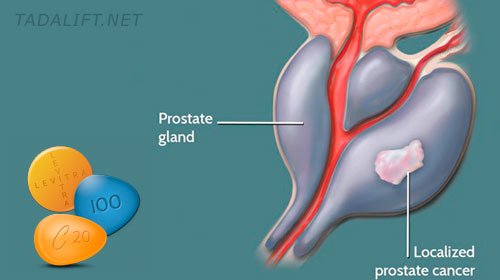Tadalafil, widely recognized as Cialis, is a medication best known for treating erectile dysfunction (ED). Beyond its primary use, emerging research suggests it may offer benefits in cancer treatment, particularly for prostate cancer. This article delves into how tadalafil and cancer intersect, examining its role in managing symptoms, supporting therapies, and potentially aiding in early detection through regular medical checkups. We’ll also look at its applications beyond prostate cancer, drawing from recent studies and clinical insights.
Cialis And Prostate Cancer
 Prostate cancer ranks among the most common cancers in men, with over 248,000 new cases reported in the U.S. in 2021. While not a cure, tadalafil offers support for patients undergoing treatment. Radiation therapy, a standard option, often causes ED as a side effect. A study in the Journal of Urology found that Cialis can reduce this impact, helping men maintain sexual function during and after treatment. For those with prostate cancer, this improvement in quality of life is significant.
Prostate cancer ranks among the most common cancers in men, with over 248,000 new cases reported in the U.S. in 2021. While not a cure, tadalafil offers support for patients undergoing treatment. Radiation therapy, a standard option, often causes ED as a side effect. A study in the Journal of Urology found that Cialis can reduce this impact, helping men maintain sexual function during and after treatment. For those with prostate cancer, this improvement in quality of life is significant.
The 2020 blog post highlights how ED drugs like Cialis encourage men to see a doctor, often leading to early prostate cancer detection. Prevention efforts, such as self-palpation for testicular cancer, underscore the value of proactive health checks—something tadalafil use indirectly promotes.
Cialis Benefits On Prostate Cancer
Studies provide mixed but promising insights. A trial in the International Journal of Radiation Oncology, Biology, Physics tested tadalafil in 242 men receiving radiotherapy for prostate cancer. Over 24 weeks, it didn’t markedly outperform a placebo in restoring erectile function but proved safe and tolerable. Another study in the Journal of Sexual Medicine focused on men post-radical prostatectomy—a surgery to remove the prostate. Here, tadalafil aided in preserving sexual function, suggesting it as a helpful follow-up therapy.
Benefits of Cancer Therapy
Tadalafil’s reach extends beyond prostate cancer. Research shows that PDE5 inhibitors can enhance cancer treatments. A Cancer Research study revealed that tadalafil slows cancer cell growth in lab settings, targeting pathways that drive progression in lung cancer and melanoma. It triggers apoptosis—programmed cell death, offering a new angle for therapy.
The Journal of Clinical Oncology reported that tadalafil boosts chemotherapy by crossing the blood-brain barrier, improving drug delivery to brain tumors like glioblastoma. This aligns with the 2020 blog’s note on ED drugs overcoming this barrier, enhancing anticancer agents. A Molecular Cancer Therapeutics study also found that tadalafil amplifies doxorubicin’s effects in breast cancer mouse models, reducing tumor size more effectively than the drug alone.
Recent Studies On Tadalafil And Cancer
Fresh findings fuel optimism. A Frontiers in Oncology study showed tadalafil halting pancreatic cancer cell growth, while a Cancers study paired it with immune checkpoint inhibitors in melanoma models, boosting immune responses. A current clinical trial is testing tadalafil with chemotherapy for advanced solid tumors, aiming to improve drug delivery and outcomes. These efforts echo the 2020 post’s observation of growing evidence for PDE5 inhibitors in oncology, spotlighting tadalafil’s potential.
Tadalafil is generally safe, with side effects like headaches, indigestion, or back pain that fade quickly. However, for cancer patients, these risks may shift due to weakened health or other treatments. It’s vital to consult a doctor, as tadalafil can interact with drugs like nitrates or chemotherapy agents, potentially causing low blood pressure. The 2020 blog mentions sildenafil’s cardioprotective role with doxorubicin; tadalafil may share similar benefits, but medical oversight is key.
Frequently Asked Questions
Can Tadalafil Lower Cancer Risk?
Tadalafil isn’t a proven shield against cancer, but a Cancer Epidemiology, Biomarkers & Prevention study linked PDE5 inhibitors to a reduced risk of colorectal cancer. More research is needed to confirm this for tadalafil specifically.
Is Tadalafil Safe During Cancer Treatment?
Yes, for most patients, it depends on individual health and medications. Doctors can assess whether tadalafil fits into a treatment plan and ensure no harmful interactions.
How Does Tadalafil Affect Cancer Drugs?
It may enhance some therapies, like chemotherapy, by improving drug delivery. However, it can clash with nitrates or alpha-blockers, so coordination with a healthcare provider is essential.

